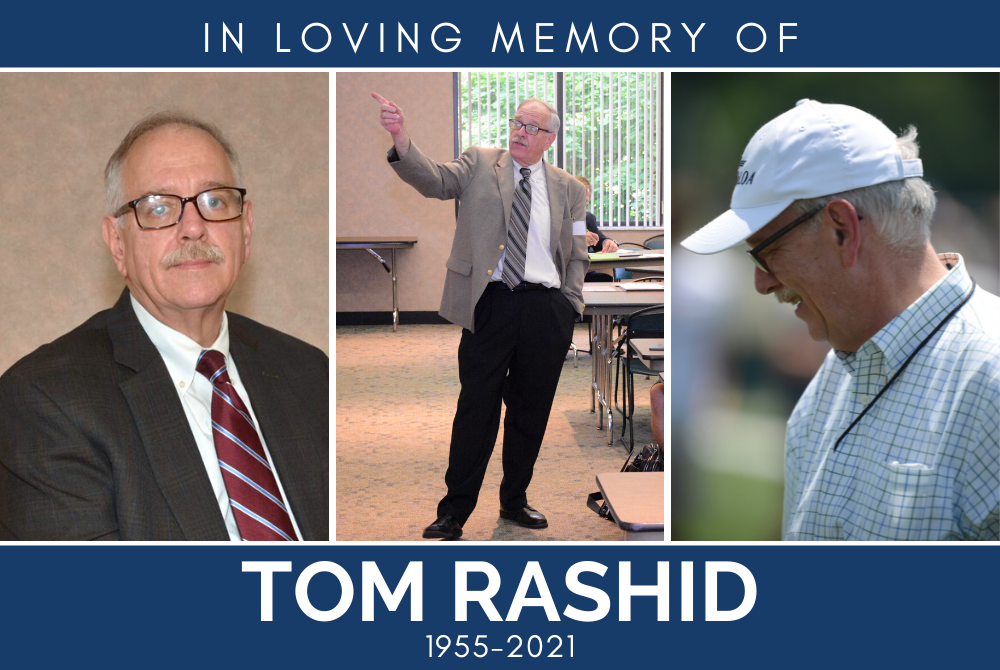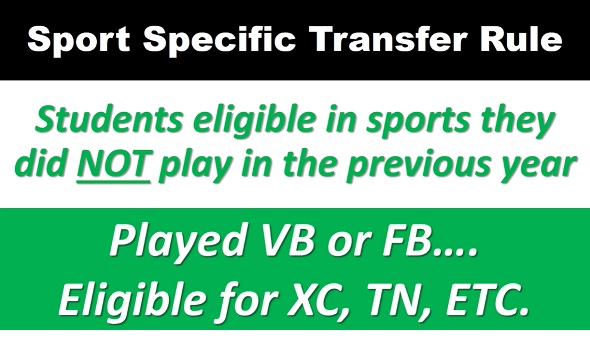
MHSAA Associate Director Rashid Dies at 66
By
Geoff Kimmerly
MHSAA.com senior editor
December 4, 2021
Thomas M. Rashid, who served as associate director for two executives during 18 years with the Michigan High School Athletic Association, died Friday, Dec. 3, after a courageous battle with cancer. He was 66.
Rashid became lead assistant to retired Executive Director John E. “Jack” Roberts in 2003, and continued serving in that position after Roberts’ retirement and the selection of Mark Uyl as the next MHSAA leader in 2018.
Rashid was best-known by the athletic directors who have served the MHSAA’s 750 high schools, as Rashid often was their first call with questions regarding the MHSAA Handbook or eligibility issues. Rashid also led the annual UPDATE meetings tour, during which he would provide training and answers on the latest rules changes at stops all over the state. He coordinated and presented orientations each fall for newly-hired athletic directors and also presented annual sessions to administrative assistants.
He served as the MHSAA’s administrator of boys lacrosse for its entirety as an MHSAA-sponsored sport, beginning in 2005, and also oversaw the MHSAA’s Charles E. Forsythe, Allen W. Bush and Vern L. Norris awards programs.
“We are heartbroken with the loss of our dear friend and colleague, Tom,” Uyl said. “He had so many incredible gifts, the greatest being his ability to talk and communicate with people even when having to share difficult or bad news. He was so good with people, and his care and concern for others is one of Tom’s greatest legacies.
“So many of us are hurting because Tom was such a special man who made impacting people and school sports in our state his life’s work and passion. His example and legacy of helping others will live on within the MHSAA community for years.”
Prior to joining the MHSAA staff, Rashid served as director of physical education and athletics for the Archdiocese of Detroit, and as Director of the Catholic High School League, for 15 years. In those positions, he coordinated athletic schedules and tournaments for the league’s 37 schools. He also served on the MHSAA’s legislative body – the Representative Council – from 1988 until his hire at the MHSAA, including as the Council’s Secretary-Treasurer.
Rashid graduated from St. Alphonsus High School in Dearborn in 1973. He obtained his bachelor’s degree in history from Eastern Michigan University, and his master’s degree in urban education from the University of Michigan-Dearborn.
He became athletic director at St. Alphonsus in 1977, serving in that position for seven years before working in the same capacity at Riverview Gabriel Richard for slightly more than three years until joining the Catholic League staff as assistant director in December 1987. He assumed the Catholic League’s top post the following August.
Rashid sat on the Board of Directors for the Michigan Interscholastic Athletic Administrators Association from 1988-2000 and served as its president in 1998.
He received national recognition in 1999 when he was presented with the National Interscholastic Athletic Administrators Association’s State Award of Merit. In 2001, Rashid was honored with the MHSAA’s Allen W. Bush Award, which recognizes noteworthy behind-the-scenes support to interscholastic athletics. In 2003, Rashid received Athletic Director of the Year awards from the MIAAA and National High School Athletic Coaches Association, and he also received an NFHS Citation that year.
He was named to the Detroit Catholic High School League Hall of Fame in 2002 and Michigan High School Lacrosse Coaches Association Hall of Fame in 2017. He also received the MIAAA's Special Recognition Award in 2017 for his continued service to the school sports community.

Brush Up on the New Transfer Rule
July 18, 2019
By Rob Kaminski
MHSAA benchmarks editor
Eligibility under the new “sport-specific” transfer rule begins this coming fall after circulating extensively for nearly one school year.
Unless one of the stated 15 exceptions is met, participation during the 2018-19 school year determines eligibility for 2019-20.
The new rule adopted by the Representative Council at its May 2018 meeting has found support among most audiences. A transfer student’s eligibility in 2019-20 is based upon that student’s participation from this past school year (2018-19). It will be paramount for administrators and coaches to have awareness of the sports a transfer student participated in during the previous school year.
The long-standing 15 Exceptions to immediate eligibility, such as a full and complete residential change or a student moving between divorced parents by completing of an Educational Transfer Form, did not change.
One might call the rule on the way out “The Fourth-Friday Transfer Rule.” Under this old rule, when a student enrolled at the new school determined his or her eligibility. Under the new Sport Specific Transfer rule, what a student played in the previous season determines eligibility.
The Council passed a more lenient rule on the one hand and more restrictive on the other. The more lenient aspect is a change that finds a transfer student ELIGIBLE in any sport in which he or she did not participate in a game or a scrimmage in the previous school year.
The more restrictive portion tends to discourage students who change schools for sports reasons. A transfer student who did play a sport in the previous season – and who does not meet one of the 15 Exceptions – is NOT ELIGIBLE in that sport for the next season. If a student changes schools in mid-season, the student would be ineligible for the rest of that season in that sport and the next season for that sport.
Participation under this and other rules means playing in an interscholastic game or scrimmage after starting the 9th grade at any high school. It does not mean practice, but entering an interscholastic game, meet or scrimmage in any way. It also may involve more than one sport, so a three-sport athlete who does not have a residential change and transfers would be ineligible in those sports during the next school year – but eligible for any other sport. It also means a student cut from a team – one who never entered a scrimmage or game – may transfer and play without delay for that new school’s team. It may also mean that a student who meets one of the stated exceptions such as a residential change but enrolls in a school other than her or his school of residence, would have eligibility in sports not played in the previous year.
The new rule will tend to discourage students from changing schools for sports because they would be ineligible in any sport they have played in school the previous season for that sport. It will increase participation for some students who were otherwise not eligible under the current rule.
It is always best to contact school athletic directors who can connect with the MHSAA to verify eligibility prior to enrollment.
If the student’s new school requests in writing, the MHSAA Executive Committee may approve a waiver that reduces the period of ineligibility to 90 scheduled school days at the new school if the change of schools was for compelling reasons demonstrated with outside documentation having nothing to do with sports, curriculum, finances, and school demographics. The Executives Committee also has authority to approve immediate eligibility.

